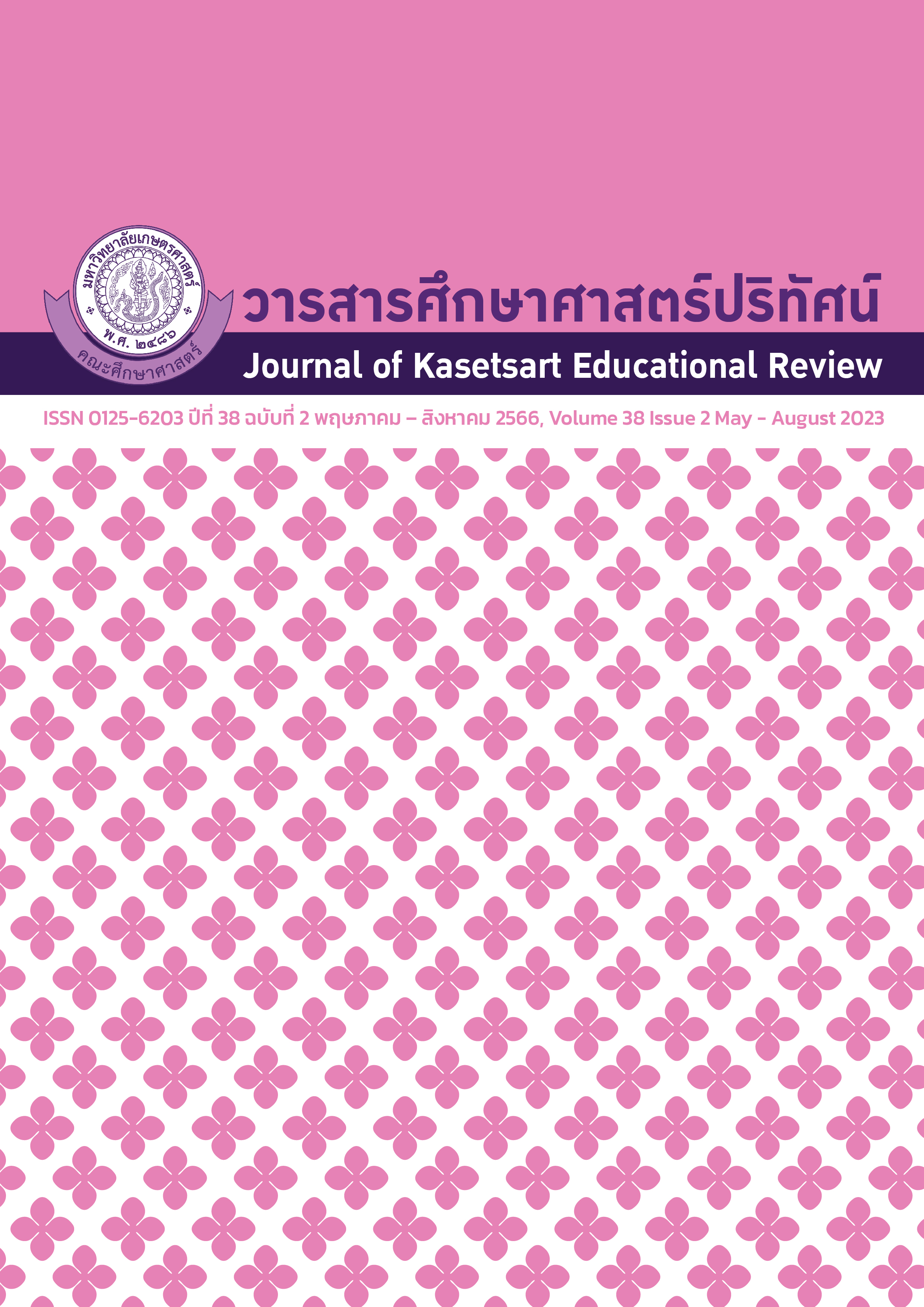ศาสตร์การสอนคหกรรมศาสตร์แนวใหม่: การสังเคราะห์งานวิจัยในฐานข้อมูล Scopus ช่วงทศวรรษที่ผ่านมา
คำสำคัญ:
ศาสตร์การสอน, คหกรรมศาสตร์, การสังเคราะห์งานวิจัยบทคัดย่อ
การวิจัยครั้งนี้มีวัตถุประสงค์เพื่อสังเคราะห์ศาสตร์การสอนคหกรรมศาสตร์แนวใหม่ผ่านการศึกษางานวิจัยในฐานข้อมูล Scopus ที่ตีพิมพ์ในช่วงทศวรรษที่ผ่านมา วิธีการวิจัยใช้การศึกษาเอกสาร ประชากรในการวิจัยได้แก่งานวิจัยทางด้านคหกรรมศาสตรศึกษาที่ตีพิมพ์เผยแพร่ในปี พ.ศ. 2557 – 2566 (ค.ศ. 2014 – 2023) บนฐานข้อมูล Scopus เครื่องมือที่ใช้ในการวิจัย ได้แก่ แบบถอดรหัสซึ่งดัดแปลงจาก Hutchinson & Lovell (2004) เพื่อให้ได้มาซึ่งองค์ความรู้เกี่ยวกับศาสตร์การสอนคหกรรมศาสตร์แนวใหม่ โดยมีองค์ประกอบคือ กลยุทธ์การสอน บทบาทครู บทบาทผู้เรียน และผลกระทบ ตรวจสอบคุณภาพเครื่องมือวิจัยโดยการศึกษาความตรงเฉพาะหน้าและหาค่าดัชนีความสอดคล้องโดยผู้เชี่ยวชาญทางการศึกษา ผลการศึกษาพบว่า กลยุทธ์การสอนคหกรรมศาสตร์แนวใหม่ คือ การบูรณาการเชื่อมโยง การพัฒนาทักษะการคิด การเข้าร่วมทางสังคม และการพัฒนาทักษะกระบวนการ บทบาทครูคือ เป็นนักออกแบบการสอน นักคิด นักเชื่อมโยง นักเล่าเรื่อง และนักตั้งคำถาม บทบาทผู้เรียนคือเป็นผู้ใฝ่เรียนรู้แบบตื่นตัว ฝึกคิด ฝึกแก้ปัญหา และฝึกทำงานเป็นทีม ผลกระทบที่มีต่อตัวผู้เรียนคือจะเป็นผู้เรียนที่รอบรู้ในศาสตร์ และสามารถขยายผลเชิงบวกต่อการพัฒนาครอบครัว ชุมชน สังคมและเศรษฐกิจที่ยั่งยืน
เอกสารอ้างอิง
Andreasen, K. E., & Rasmussen, A. (2022). The Development of Home Economics as a Field of Knowledge and its Contribution to the Education and Social Status of Women. Nordic Journal of Educational History, 9(2), 63-84. https://doi.org/10.36368/njedh.v9i2.265
Beinert, C., Øverby N. C., & Vik, F. N. (2021). Project LifeLab Food and Health – Innovative Teaching for the Future: Development of Student Active Learning Tasks for Home Economics Education in the 21st Century. Center for Educational Policy Studies Journal, 11(4), 63-80. https://doi.org/10.26529/CEPSJ.1179
Bender, U. (2015). Interdisciplinary nutritional education: Interventional study on inter-disciplinary learning in home economics and English. Ernahrungs Umschau, 62(6), 92-97.
Brante G., & Brunosson, A. (2014). To double a recipe – interdisciplinary teaching and learning of mathematical content knowledge in a home economics setting. Education Inquiry, 5(2), Article 23925. https://doi.org/10.3402/edui.v5.23925
Brunosson, A., Brante, G., Sepp, H., & Mattsson, S. Y. (2014). To use a recipe not a piece of cake. Students with mild intellectual disabilities' use of recipes in home economics. International Journal of Consumer Studies, 38(4), 412-418. https://doi.org/10.1111/ijcs.12109
Causing, F. Y., Jimenez, M. A. B., Edobane, R., Agunda, J., & Biyo, C. (2022). Employment Trends of Master of Science in Home Economics Graduates from a State University in the Philippines. Journal of Pharmaceutical Negative Results, 13(1), 1687–1696. https://doi.org/10.47750/pnr.2022.13.S01.202
Deagon, J. R. (2021). I Do, We Do, You Do Home Economics: Explicit Instruction Connecting Content with Ideology. Center for Educational Policy Studies Journal, 11(4), 135-150. https://doi.org/10.26529/CEPSJ.1188
Erjavšek, M. (2021). Modern Aspects of Home Economics Education and Slovenia. Center for Educational Policy Studies Journal, 11(4), 33-62. https://doi.org/10.26529/CEPSJ.1191
Haapaniemi, J., Venäläinen, S., Malin, A., & Palojoki, P. (2019). Home economics education: exploring integrative learning. Educational Research, 61(1), 87-104. https://doi.org/10.1080/00131881.2018.1564626
Haapaniemi, J., Venäläinen, S., Malin, A., & Palojoki, P. (2023). Amplifying the voice of pupils: using the diamond ranking method to explore integrative and collaborative learning in home economics education in Finland. Education Inquiry, 14(1), 125-144. https://doi.org/10.1080/20004508.2021.1966888
Hutchinson, S. R., & Lovell, C. D. (2004). A review of methodological characteristics of research published in key journals in higher education: Implications for graduate research training. Research in Higher Education, 45(4), 383–403. https://doi.org/10.1023/B:RIHE.0000027392.94172.d2
Kostanjevec, S., & Kozina, F. L. (2021). Home economics education as needed in the 21st century [Editorial]. Center for Educational Policy Studies Journal, 11(4), 7-11. https://doi.org/10.26529/CEPSJ.1348
National Strategy 2018-2037. (2018, 13 October). The Government Gazette. 35 (82), 1-61. [in Thai].
Nurlaela, L., Romadhoni, I. F., Widodo, W., & Ana, A. (2017). Application-based instructional tools for enhancing students’ problem solving skills in home economics. Journal of Technical Education and Training, 9(2), 46-56.
Nwabah, N. I., & Anne, I. C. (2014). Effect of constructivist instrumental four-step approach on the achievement and retention in pattern drafting by Nigerian certificate in education home economics students in South-South Zone, Nigeria. Nurture, 8(1), 8-19.
Pendergast, D. (2021). The Role of Home Economics Education in the 21st Century: The Covid-19 Pandemic as a Disruptor, Accelerator, and Future Shaper. Center for Educational Policy Studies Journal, 11(4), 13-32. https://doi.org/10.26529/CEPSJ.1205
Quindemil, T. E. M., Cobo, F. E. P., Chaparro, M. E. I., & Padrón, Q. F. (2023). Bibliometric study on SMEs according to Scopus, Period 2016-2020. Revista Venezolana de Gerencia, 28(101), 228-247. https://doi.org/10.52080/rvgluz.28.101.15
Schotten, M., Aisati, M., Meester, W., Steiginga, S., & Ross, C. (2017). A Brief History of Scopus: The World’s Largest Abstract and Citation Database of Scientific Literature. Auerbach Publications. https://doi.org/10.1201/9781315155890-3
Soo, L. M. J., & Chua, S. K. C. (2014). The 21st century approach in teaching home economics: A singapore perspective. International Journal of Pedagogy and Curriculum, 20(2), 61-75. https://doi.org/10.18848/2327-7963/CGP/v20i02/48959
Shah, R. K. (2021). Conceptualizing and Defining Pedagogy. IOSR Journal of Research & Method in Education, 11(1), 6-29. https://doi.org/10.9790/7388-1101020629
Taar, J., & Palojoki, P. (2022). Applying interthinking for learning 21st-century skills in home economics education. Learning, Culture and Social Interaction. 33, Article 100615. https://doi.org/10.1016/j.lcsi.2022.100615
UNESCO. (2017). E2030: Education and Skills for the 21st Century. Chile: United Nations Educational and the Regional Office for Education in Latin America and the Caribbean.
ดาวน์โหลด
เผยแพร่แล้ว
ฉบับ
ประเภทบทความ
สัญญาอนุญาต
ลิขสิทธิ์ (c) 2023 วารสารศึกษาศาสตร์ปริทัศน์

อนุญาตภายใต้เงื่อนไข Creative Commons Attribution-NonCommercial-NoDerivatives 4.0 International License.
บทความทุกบทความเป็นลิขสิทธิ์ของวารสารคณะศึกษาศาสตร์ มหาวิทยาลัยเกษตรศาสตร์ วิทยาเขตบางเขน
วารสารศึกษาศาสตร์ปริทัศน์ (Kasetsart Educational Review)






